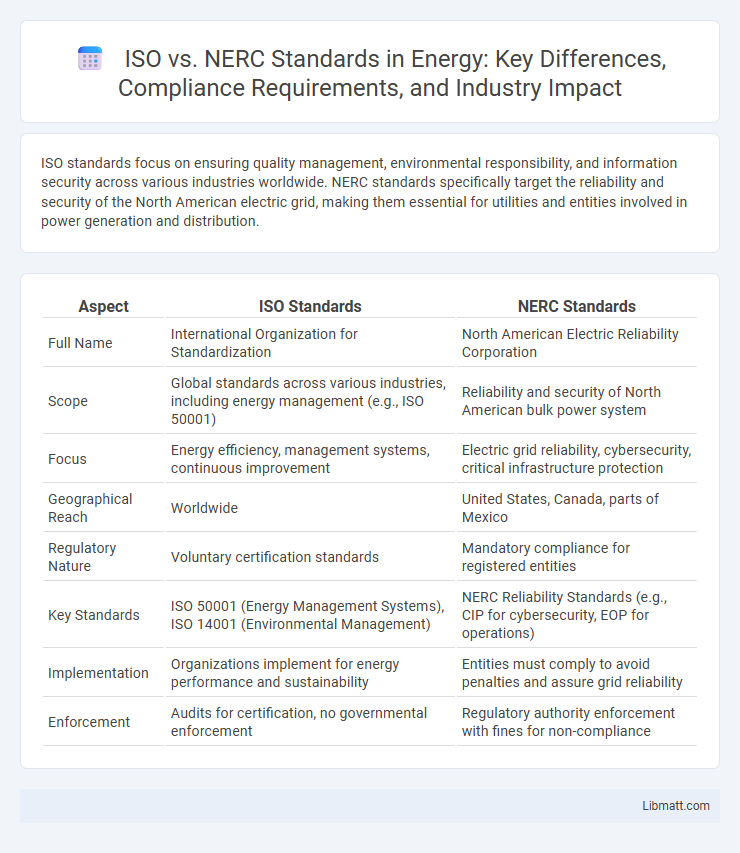ISO standards focus on ensuring quality management, environmental responsibility, and information security across various industries worldwide. NERC standards specifically target the reliability and security of the North American electric grid, making them essential for utilities and entities involved in power generation and distribution.
Table of Comparison
| Aspect | ISO Standards | NERC Standards |
|---|---|---|
| Full Name | International Organization for Standardization | North American Electric Reliability Corporation |
| Scope | Global standards across various industries, including energy management (e.g., ISO 50001) | Reliability and security of North American bulk power system |
| Focus | Energy efficiency, management systems, continuous improvement | Electric grid reliability, cybersecurity, critical infrastructure protection |
| Geographical Reach | Worldwide | United States, Canada, parts of Mexico |
| Regulatory Nature | Voluntary certification standards | Mandatory compliance for registered entities |
| Key Standards | ISO 50001 (Energy Management Systems), ISO 14001 (Environmental Management) | NERC Reliability Standards (e.g., CIP for cybersecurity, EOP for operations) |
| Implementation | Organizations implement for energy performance and sustainability | Entities must comply to avoid penalties and assure grid reliability |
| Enforcement | Audits for certification, no governmental enforcement | Regulatory authority enforcement with fines for non-compliance |
Introduction to ISO and NERC Standards
ISO (International Organization for Standardization) develops globally recognized standards across various industries to ensure quality, safety, and efficiency, such as ISO 9001 for quality management. NERC (North American Electric Reliability Corporation) focuses specifically on reliability standards for the North American bulk power system, including mandatory requirements like NERC CIP for critical infrastructure protection. Both ISO and NERC standards serve to enhance operational integrity, with ISO providing broad international frameworks and NERC targeting energy sector compliance and grid reliability.
Overview of ISO Standards in Industry
ISO standards provide internationally recognized frameworks that enhance quality, safety, and efficiency across various industries, including manufacturing, information technology, and environmental management. These standards establish uniform criteria for products and services, facilitating global trade and compliance while promoting continual improvement and risk management. By implementing ISO standards, organizations achieve operational excellence and increase customer satisfaction through consistent and reliable processes.
NERC Standards: Purpose and Scope
NERC Standards establish mandatory reliability requirements for the bulk power system in North America, ensuring grid stability, security, and operational reliability. These standards cover critical areas including cybersecurity, emergency preparedness, and system planning to prevent blackouts and maintain consistent power delivery. NERC's jurisdiction spans electric utilities, generation, transmission, and distribution entities obligated to comply under federal law.
Key Differences Between ISO and NERC
ISO standards emphasize international consistency across industries, focusing on quality management, environmental impact, and safety protocols, whereas NERC standards are specifically designed to ensure the reliability and security of the North American bulk power system. NERC standards mandate comprehensive cybersecurity measures, system planning, and operational practices targeted at electrical grids, while ISO standards apply broadly across diverse sectors with general management system requirements. Your organization must align with NERC standards if operating within North America's energy sector, while ISO standards provide global frameworks supporting overall organizational excellence.
Compliance Requirements for ISO
ISO compliance requirements emphasize adherence to international standards focused on quality management, environmental responsibility, and information security, ensuring your organization meets globally recognized benchmarks. These requirements involve systematic documentation, continuous improvement processes, and regular audits to maintain certification. Meeting ISO standards enhances operational efficiency and market competitiveness by aligning your processes with best practices across industries.
Compliance Requirements for NERC
NERC compliance requirements focus on maintaining the reliability and security of the bulk power system through mandatory standards covering critical infrastructure protection, operations, and cybersecurity. Entities within the North American electric grid must implement controls, conduct regular audits, and submit reports to demonstrate adherence to NERC standards. Your organization must prioritize continuous monitoring and employee training to meet these strict regulatory mandates and avoid significant penalties.
Impact on Risk Management and Reliability
ISO standards emphasize a structured approach to risk management by defining clear frameworks for identifying, assessing, and mitigating risks across various industries, enhancing overall operational reliability. NERC standards specifically target the North American electric power grid, enforcing strict reliability criteria and cyber-security protocols to minimize risks of outages and ensure continuous power supply. Both standards contribute significantly to risk reduction but NERC's stringent, sector-specific mandates directly impact the stability and resilience of critical energy infrastructure.
Certification Processes: ISO vs NERC
The ISO certification process involves thorough audits by accredited third-party organizations to ensure compliance with international quality, environmental, or information security standards, such as ISO 9001 or ISO 27001. In contrast, NERC certification emphasizes stringent compliance with reliability standards specifically designed for the North American bulk power system, requiring rigorous self-assessments, audits, and mandatory incident reporting overseen by regional entities and NERC itself. While ISO certifications focus broadly on organizational management systems, NERC standards prioritize operational reliability and security within the electric grid industry.
Industry Applications and Use Cases
ISO standards primarily guide organizations in maintaining quality management and environmental responsibility, widely applied in manufacturing, healthcare, and service industries to improve operational efficiency and compliance. NERC standards focus on electric reliability and cybersecurity, crucial for utility companies and grid operators to ensure stable power delivery and protect critical infrastructure from cyber threats. Your choice between ISO and NERC depends on whether your industry prioritizes general quality management or specialized electric grid reliability and security.
Choosing the Appropriate Standard for Your Organization
Selecting the appropriate standard for your organization depends on the specific industry and regulatory requirements it faces. ISO standards provide broad, internationally recognized frameworks applicable across various sectors, focusing on quality, environmental, and information security management. NERC standards, however, target the North American bulk power system, emphasizing reliability and security critical to electrical utilities and energy organizations.
ISO vs NERC Standards Infographic

 libmatt.com
libmatt.com